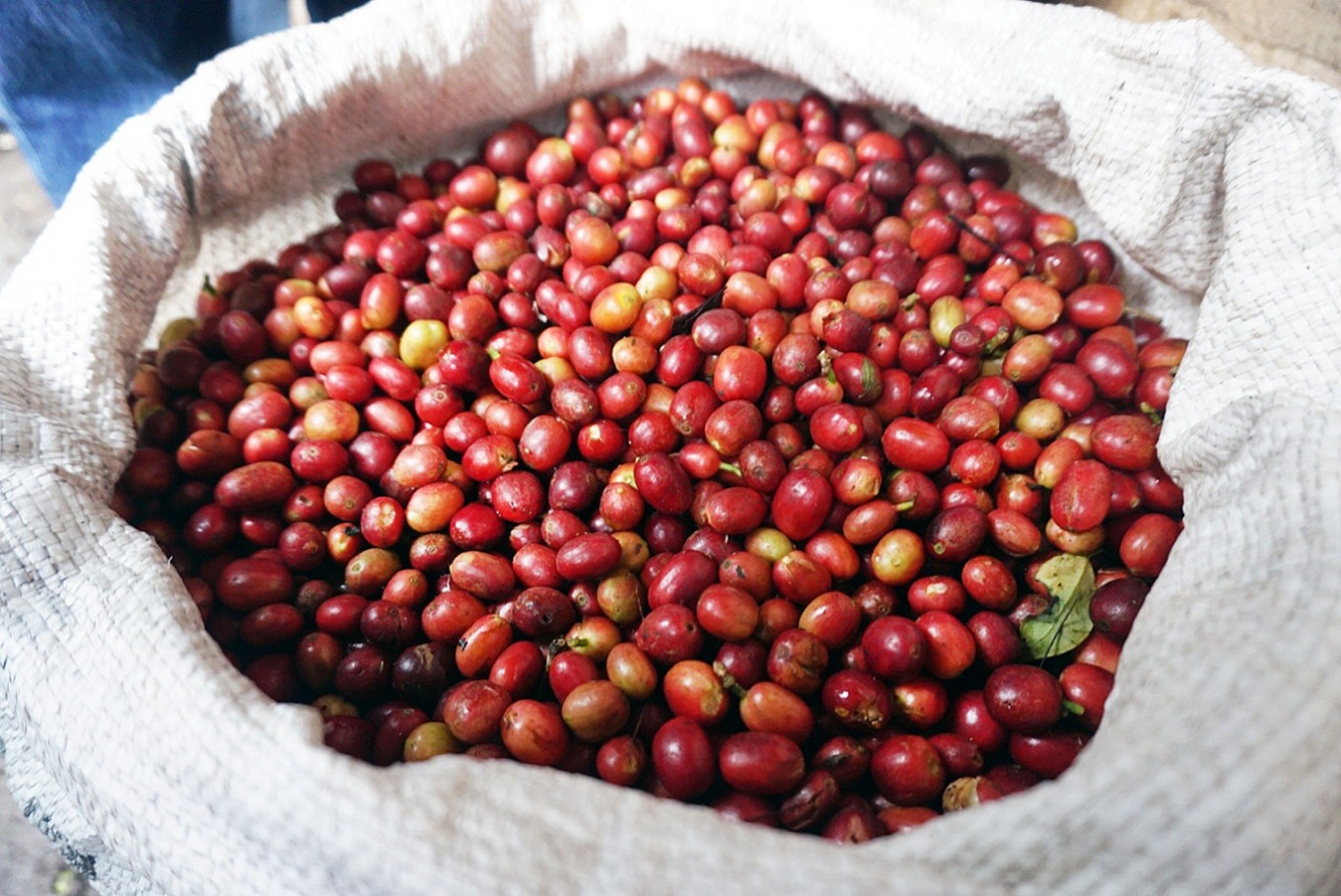Flavorful journey into coffee provenance
A true coffee lover will go beyond a cup of coffee to discover the human story behind it.
Change Size
 Freshly picked: Red cheery coffee beans are stored inside a white sack. (JP/Bina Bektiati)
Freshly picked: Red cheery coffee beans are stored inside a white sack. (JP/Bina Bektiati)
W
hat could unite a café owner, IT specialists, a financial expert, an environmentalist, a barista and an employee of an energy company? It’s coffee. They all went on a recent trip organized by the Specialty Coffee Association of Indonesia (SCAI) to Central Aceh and Bener Meriah, both in Aceh province, to explore the world of coffee.
“Coffee connects me to people of various backgrounds,” said trip participant Hans Suke, an IT specialist who started a coffee café business in 2012 in Balikpapan, East Kalimantan.
As a coffee organization with members of various backgrounds — from coffee traders to farmers; coffee experts to coffee lovers — SCAI has a mission to promote coffee the right way.

The trip was a unique way to gain knowledge about coffee as participants were given the opportunity to meet farmers and learn about mills, the coffee process, flavor profiles and technical farming terms such as microclimate. The trip also offered numerous fun activities such as coffee and local cuisine tastings, sight-seeing, local cafes visits and meet-ups with local baristas.
Read also: Five coffee shops to spend the rainy season in
There is no better way of getting the whole picture on coffee chain production than to go to Central Aceh and Bener Meriah, both home to the famous Gayo coffee. With the mountainous terrain of Bukit Barisan, winding and bumpy roads, rain, fog and cold weather, an adventurous trip awaits those looking to enjoy the province’s breathtaking scenery and coffee trees grown at 1,200 meters above sea level.
Being there means indulging in flavors of strong-bodied Gayo coffee, which leaves a certain low-acidity thickness on the palate, entertaining the taste buds with complex flavors ranging from earthy to spicy, and often times sweet with dark chocolate, caramel and berry options. Regardless of the flavor, the local cafés offer high-quality beverages.

The story of Gayo coffee is the story about farmers, soil and their livelihood. Organic cultivation and shade trees create a comfortable ecosystem for the coffee trees. The 94,500 hectares of coffee plantations in the Gayo highlands provide a suitable climate for the growth of this Arabica coffee. The plantations are mostly owned by smallholders, with a typical family of farmers having an average of one hectare to cultivate.
Coffee farming has been in the blood of locals living in the area for generations. A coffee farmer usually has parents, grandparents or even great-grandparents who make a living from coffee.
Rahmah, the leader of Ketiara Cooperative, a coffee producer that implements fair trade and organic practices, is part of a family that has been involved in the coffee business for four generations. She started as a farmer-to-farmer coffee collector about 20 years ago. In 2013, she became a coffee exporter for Ketiara Cooperative, which has 1,768 members, most of whom are women.
“We reward and punish our members,” said Rahmah.
“If a member uses pesticides on coffee trees, they will be banned from our cooperative.”
Rahmah said farmer consciousness in cultivating coffee in sustainable ways was increasingly important. Originally, the group was not driven by environmental issues, but by the high price of Gayo coffee in the international market — around 90 percent was for export.

Awareness on high-quality coffee beans is high among Gayo coffee farmers, who have been trained on respecting the cultivation process.
Rasyid, the founder of Oro Coffee Gayo, intensively and consistently shares knowledge with the farmers, holding them to a high standard. He even enforced a 73-step process in processing specialty coffee.
Read also: Coffee lovers, here are some fun facts about coffee
Specialty coffee, which Rasyid said is typically cultivated only during the peak of the harvest season, is unique because it comes from coffee trees nurtured in special microclimate conditions. The beans have almost no defects. Its unique flavor and taste is attributed to the soil in which it is grown.
For a coffee to achieve specialty coffee status, its beans must be ranked by coffee professionals and experts as 80 or above on a scale from 1 to 100.
The coffee origin trip to Aceh was special for its participants, as they could learn directly about the beans from the farmers. One participant, Pinan Masakaraeng, was inspired to apply his newfound knowledge to empower coffee farmers in his birthplace of Mamasa, West Sulawesi.
Another participant, Muhammad Arifin, who works at a research center at the Bogor Institute of Agriculture, said he learned a lot from the trip, especially on sustainable development “in which the farmers play an important role.”






